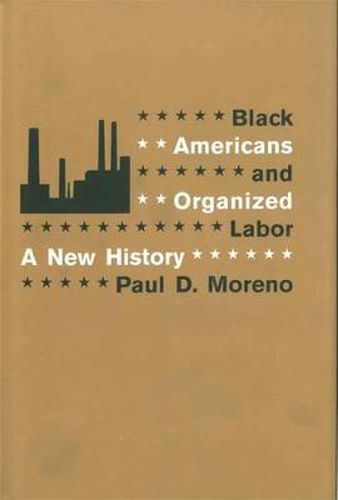Readings Newsletter
Become a Readings Member to make your shopping experience even easier.
Sign in or sign up for free!
You’re not far away from qualifying for FREE standard shipping within Australia
You’ve qualified for FREE standard shipping within Australia
The cart is loading…






This title is printed to order. This book may have been self-published. If so, we cannot guarantee the quality of the content. In the main most books will have gone through the editing process however some may not. We therefore suggest that you be aware of this before ordering this book. If in doubt check either the author or publisher’s details as we are unable to accept any returns unless they are faulty. Please contact us if you have any questions.
In Black Americans and Organized Labor, Paul D. Moreno offers a bold reinterpretation of the role of race and racial discrimination in the American labor movement. Moreno applies insights of the law-and-economics movement to formulate a powerfully compelling labor-race theorem of elegant simplicity: White unionists found that race was a convenient basis on which to do what unions do – control the labor supply. Not racism pure and simple but
the economics of discrimination
explains historic black absence and under-representation in unions.
Moreno’s sweeping reexamination stretches from the antebellum period to the present, integrating principal figures such as Frederick Douglass and Samuel Gompers, Isaac Myers and Booker T. Washington, and W. E. B. Du Bois and A. Philip Randolph. He traces changing attitudes and practices during the simultaneous black migration to the North and consolidation of organized labor’s power, through the confusing and conflicted post-World War II period, during the course of the civil rights movement, and into the era of affirmative action. Maneuvering across a wide span of time and a broad array of issues, Moreno brings remarkable clarity to the question of the importance of race in unions. He impressively weaves together labor, policy, and African American history into a cogent, persuasive revisionist study that cannot be ignored.
$9.00 standard shipping within Australia
FREE standard shipping within Australia for orders over $100.00
Express & International shipping calculated at checkout
This title is printed to order. This book may have been self-published. If so, we cannot guarantee the quality of the content. In the main most books will have gone through the editing process however some may not. We therefore suggest that you be aware of this before ordering this book. If in doubt check either the author or publisher’s details as we are unable to accept any returns unless they are faulty. Please contact us if you have any questions.
In Black Americans and Organized Labor, Paul D. Moreno offers a bold reinterpretation of the role of race and racial discrimination in the American labor movement. Moreno applies insights of the law-and-economics movement to formulate a powerfully compelling labor-race theorem of elegant simplicity: White unionists found that race was a convenient basis on which to do what unions do – control the labor supply. Not racism pure and simple but
the economics of discrimination
explains historic black absence and under-representation in unions.
Moreno’s sweeping reexamination stretches from the antebellum period to the present, integrating principal figures such as Frederick Douglass and Samuel Gompers, Isaac Myers and Booker T. Washington, and W. E. B. Du Bois and A. Philip Randolph. He traces changing attitudes and practices during the simultaneous black migration to the North and consolidation of organized labor’s power, through the confusing and conflicted post-World War II period, during the course of the civil rights movement, and into the era of affirmative action. Maneuvering across a wide span of time and a broad array of issues, Moreno brings remarkable clarity to the question of the importance of race in unions. He impressively weaves together labor, policy, and African American history into a cogent, persuasive revisionist study that cannot be ignored.